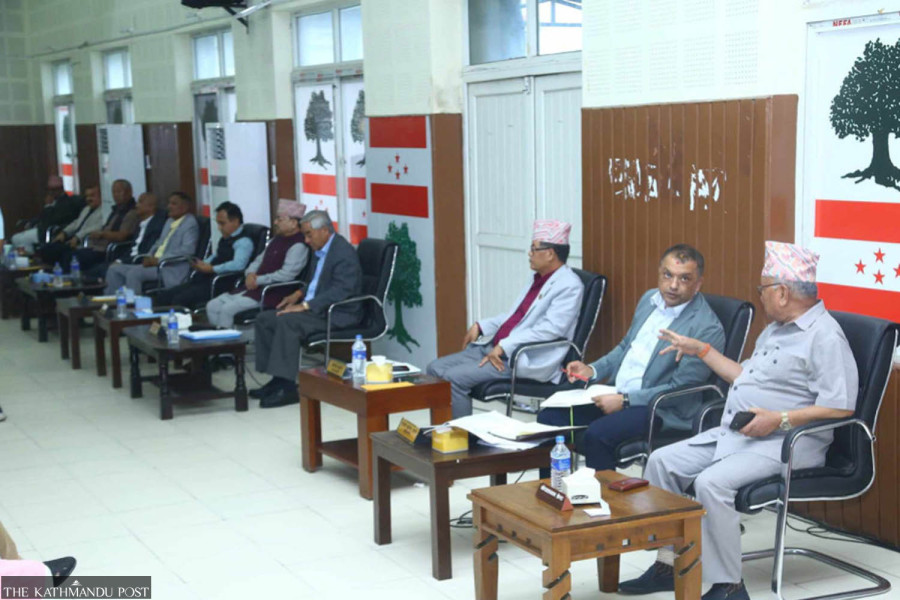Politics
Congress meeting yields compromise policy on poll ties
Allowing party workers and supporters to vote for ‘tree’ leaves door for alliances open, leaders say.
Purushottam Poudel
The Nepali Congress Central Working Committee on Sunday decided to hold the 15th general convention as stipulated in the party charter.
Announcing the date of the next general convention was one of the contentious issues at the central committee, which met for almost a month with gaps in between. Now the committee decided to hold the convention as per the party’s statute—but without specifying the convention dates.
Under the party charter, every elected body is given a four-year term. The charter provides a year’s extension if the general convention cannot be held within four years. Further, if an emergency renders it impossible to hold the convention, Nepal’s constitution permits a six-month postponement.
During the central committee meeting, the dissident faction in the Congress demanded that the next general convention be held on time, that is by the end of 2025. But a final decision was made without specifying the dates, giving the leadership the room for manoeuvre.
But party general secretary Gagan Thapa denies the charge. On the general convention, the agreement reached is a win-win for both the rival and establishment factions, he said.
“Before declaring the general convention we had to form a legislative committee, to which the central committee agreed,” Thapa told the Post. “Not declaring the date of general convention may have given the impression of victory to the party president, but there was also a win for us when the party agreed to form a legislation drafting committee.”
Even though the party statute mentions that a general convention should be held every four years, the same statute also allows for a one-year postponement of the convention. The legislation committee will be entrusted to draft the party’s statute that is endorsed by the periodic convention.
The Congress secretariat members also say the party wouldn’t be able to hold the general convention by the end of 2025 even if the dates were declared.
The party’s statute mentions that a year before the general convention, the party should complete conventions at the local level. For that, the party must hold its local conventions by the end of December.
The Congress central committee meeting, which was supposed to end on August 28, was extended until Sunday in the absence of consensus among the top leaders on the report presented by the general-secretary duo.
The central committee’s concluding meeting also decided to pass the policy proposal presented by Vice-president Purna Bahadur Khadka, the organisational proposal presented by General Secretary Thapa, and the contemporary political proposal presented by Bishwa Prakash Sharma at the party’s Mahasamiti meeting back in February.
The Mahasamiti meeting unanimously passed the three important proposals of Khadka, Thapa, and Sharma. However, it had also kept the space open for the central working committee to modify the proposal before its endorsement.
A meeting of the present and former Congress office bearers on Saturday decided to take a midway approach to the two proposals that Thapa and Sharma presented during the Mahasamiti meeting. The party leaders have no fundamental differences on the proposal presented by Vice-president Khadka.
In Thapa’s proposal, he urges not forging a political alliance for the next election, among other things, while Sharma had proposed the ‘exit policy.’
For consensus on the proposal tabled by the two general secretaries, Congress President Sher Bahadur Deuba sat with them multiple times before Sunday’s meeting.
The meeting approved Thapa’s proposal with minor changes but Sharma’s paper has been pushed back to be considered while amending the constitution as it includes broad national issues such as term limits on persons serving as the country’s president or the prime minister, party leaders say.
“General Secretary Sharma’s proposal was related not only to the party’s statute but also to the constitution, so the party has decided to raise the issue while amending the constitution,” Prakash Saran Mahat, the party spokesperson, told the Post.
On Thapa’s proposal, the central committee decided that all the party’s supporters and well-wishers would vote for the Congress symbol of ‘tree’ in the next election without mentioning whether the party would forge any election alliance.
However, Thapa claims that his original proposal presented at the Mahasamiti meeting has been passed by the central committee. “There are no changes.”
Min Bahadur Bishwokarma, the party’s publicity department head, has a different take. “Yes, we decided that our well-wishers and party supporters will be able to stamp on the party’s election symbol in the next election,” Bishwokarma told the Post. “But we have not ruled out electoral alliances either.”
Party leaders close to Deuba are in favour of leaving the final decision on strategic issues like forging alliances to election-time. The proposal that the party passed is open to electoral alliances, though the preference is not to forge such alliances, Bishowkarma said.
In his contemporary political proposal, Sharma has proposed an ‘exit policy for senior leaders', recommending term limits: one term for the [country’s] President, two terms for prime ministers, three terms for ministers, and four terms for lawmakers.
The central committee also has given legitimacy to the seven-point agreement it signed with the CPN-UML. The two parties forged a governing coalition based on the July 1 agreement. Under this, UML chair and Prime Minister KP Sharma Oli would hand over the reins to Deuba after two years.
“Our party is committed to the power-sharing deal with the UML,” Thapa told the Post.
“As the country’s two largest parties have come together to form the government, we don’t have the luxury of failing to deliver. Only through delivery can we remove public disenchantment towards the political parties,” Thapa said. “We have agreed to give the government our full support.”




 13.12°C Kathmandu
13.12°C Kathmandu














